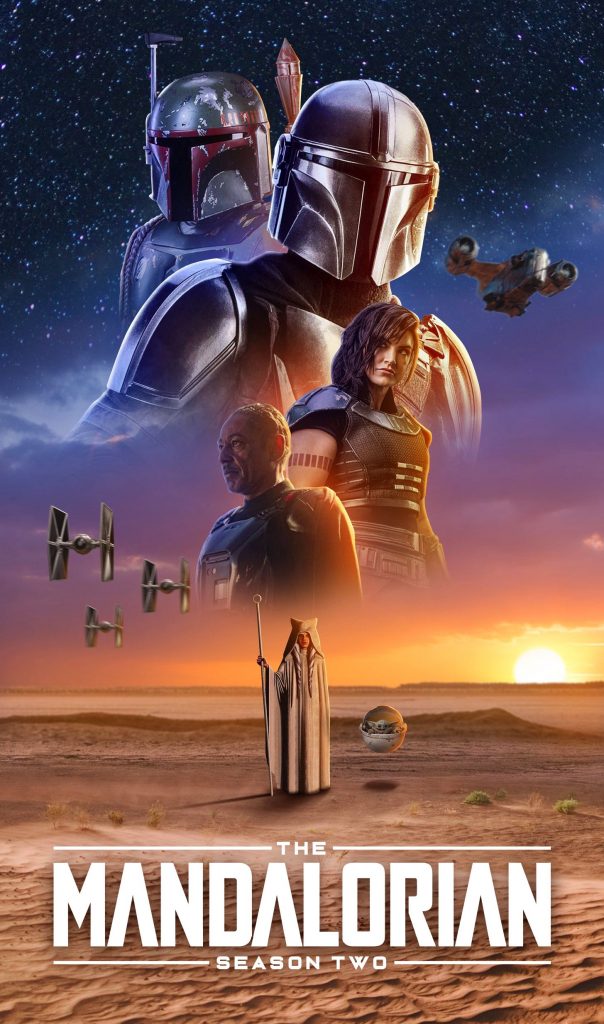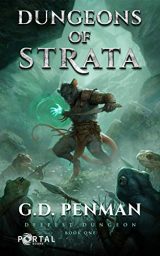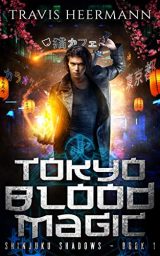Quick Reviews: The Mandalorian, Dungeons of Strata, and Tokyo Blood Magic
Wednesday , 23, December 2020 Uncategorized Leave a comment Star Wars’ variation on the classic Lone Wolf & Cub returns, with the titular and laconic Mandalorian searching for a Jedi to return the Yoda-like Child to. As the quest develops, so do the cameos, tying together skeins from The Clone Wars, Rebels, the Extended Universe, and the current Disney canon. And always in the shadows, the threat of Moff Gideon and his dark troopers loom, to reclaim the Child for medical experiments unknown.
Star Wars’ variation on the classic Lone Wolf & Cub returns, with the titular and laconic Mandalorian searching for a Jedi to return the Yoda-like Child to. As the quest develops, so do the cameos, tying together skeins from The Clone Wars, Rebels, the Extended Universe, and the current Disney canon. And always in the shadows, the threat of Moff Gideon and his dark troopers loom, to reclaim the Child for medical experiments unknown.
Touted as the one thing Disney did right with Star Wars, Season 2 of The Mandalorian is not without its missteps. Several attempts at humor surrounding the Child fall flat. And the Mandalorian is closer to Jack Burton of Big Trouble in Little China than the heroics of Luke Skywalker or Han Solo. He is a capable man fighting along giants instead of the hero. Perhaps most telling is The Mandalorian‘s continued flirting with the greediest of Disney’s sins: to understand what is happening on the screen, one must be fully versed in the Star Wars literary, gaming, and television scenes–and paying for each along the way. Even longtime fans of the movies will be confused by the sudden appearances of unfamiliar Admirals, operations, and Jedi. But the explosive appearance of three key figures from Star Wars’ history provide enough spectacle to distract from the required homework.
This is not to say that The Mandalorian does not continue its excellence. The television series continues to be a welcomed departure from the conversation-heavy and action-light stories that fill Disney’s comics, television, and movies. And it is to the show’s credit that the emotional core of the series, the bond between the Mandalorian lone wolf and the Child, is so strongly portrayed with few words, body language, and Star Wars’s trademark visual design. And the various directors have managed to build upon the feel and the action scenes of the Lucas movies. In many ways, The Mandalorian best captures the spirit of the original Star Wars trilogy, even with its modernist trappings. Just beware, if you like it, there will be 10 more series just like it on Disney+ in the next few years.
 After crushing the latest World of Warcraft clone, Martin and his guild, Iron Riot, quietly disband. Until a sudden package on his doorstep provides the necessary hardware for the new immersive MMO, Dungeons of Strata. Exploring this new grim-dark world in a crusade against darkness proves to be just the stimulating challenge Martin needs. But as Iron Riot reforms for the race to the Dungeons of Strata’s deepest level, other players, guilds, and even the programmers conspire to prevent Martin from succeeding. For Iron Riot has made enemies in the other games, and it is time to settle the score.
After crushing the latest World of Warcraft clone, Martin and his guild, Iron Riot, quietly disband. Until a sudden package on his doorstep provides the necessary hardware for the new immersive MMO, Dungeons of Strata. Exploring this new grim-dark world in a crusade against darkness proves to be just the stimulating challenge Martin needs. But as Iron Riot reforms for the race to the Dungeons of Strata’s deepest level, other players, guilds, and even the programmers conspire to prevent Martin from succeeding. For Iron Riot has made enemies in the other games, and it is time to settle the score.
Grimdark without nobility, litRPG without fantasy. Dungeons of Strata would be a perfect set-up for an isekai, but mundane characters and mundane goals hold this book back. There’s glimmers of novelty in the mechanics, but gimmicks only sustain a story for a short time. There is a reason why streamers tend to be over-the-top personalities. Because without the personality, watching video games is dull. The bond is with the streamer, not the game. And for something as mundane as a world-first guild run, you need more than an average Joe gamer with average Joe rivals.
 Django Wong is a ninja-trained sorcerer in a wuxia-inspired underground that combines Harry Dresden, yakuza thugs, Japanese mythology, Chinese cultivation, and the seedier neighborhoods far from the bright lights of Tokyo. Wong is tasked by the Council to track down rampaging youkai and Awakening sorcerers. But Wong’s newest assignment threatens to unseat the fragile peace between the Council and the Black Lotus yakuza clan. Worse still, Wong must bring in his long lost love, dead or alive–if he can, that is.
Django Wong is a ninja-trained sorcerer in a wuxia-inspired underground that combines Harry Dresden, yakuza thugs, Japanese mythology, Chinese cultivation, and the seedier neighborhoods far from the bright lights of Tokyo. Wong is tasked by the Council to track down rampaging youkai and Awakening sorcerers. But Wong’s newest assignment threatens to unseat the fragile peace between the Council and the Black Lotus yakuza clan. Worse still, Wong must bring in his long lost love, dead or alive–if he can, that is.
Heerman’s Tokyo is a mishmash of influences that owe more to John Wick, Rising Sun and Tokyo Suckerpunch than the well-worn path tread by Inuyasha and Touhou Project fans. The youkai encountered are truly monstrous, as are the criminals, and the cost in lives and misery of the various undergrounds is always close at hand, if not bleeding out on the sidewalks. It is the setting and the almost alien system of maho that sets Tokyo Blood Magic apart, as Django is yet another sympathetic gangster in a foreign underworld. But he is compelling enough to keep a reader’s attention through the moebuis-strip plot that wraps around itself a little too nicely into a bow. Intended as the start of a new series, Tokyo Blood Magic instead leaves Django with little else to go.
Please give us your valuable comment